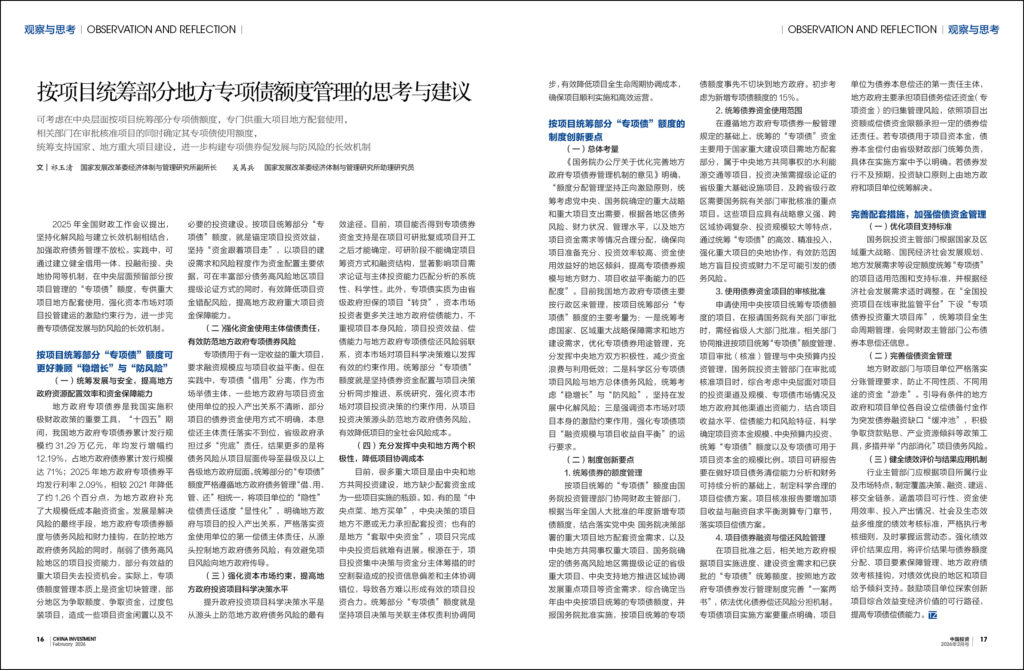
文|祁玉清 国家发展改革委经济体制与管理研究所副所长 吴昺兵 国家发展改革委经济体制与管理研究所助理研究员
导读
●按项目统筹部分“专项债”额度可更好兼顾“稳增长”与“防风险”
● 按项目统筹部分“专项债”额度的制度创新要点
● 完善配套措施,加强偿债资金管理
2025年全国财政工作会议提出,坚持化解风险与建立长效机制相结合,加强政府债务管理不放松。实践中,可通过建立健全借用一体、投融衔接、央地协同等机制,在中央层面预留部分按项目管理的“专项债”额度,专供重大项目地方配套使用,强化资本市场对项目投管建运的激励约束行为,进一步完善专项债促发展与防风险的长效机制。
按项目统筹部分“专项债”额度可更好兼顾“稳增长”与“防风险”
(一)统筹发展与安全,提高地方政府资源配置效率和资金保障能力
地方政府专项债券是我国实施积极财政政策的重要工具,“十四五”期间,我国地方政府专项债券累计发行规模约31.29万亿元,年均发行增幅约12.19%,占地方政府债券累计发行规模达71%;2025年地方政府专项债券平均发行利率2.09%,相较2021年降低了约1.26个百分点,为地方政府补充了大规模低成本融资资金。发展是解决风险的最终手段,地方政府专项债券额度与债务风险和财力挂钩,在防控地方政府债务风险的同时,削弱了债务高风险地区的项目投资能力,部分有效益的重大项目失去投资机会。实际上,专项债额度管理本质上是资金切块管理,部分地区为争取额度、争取资金,过度包装项目,造成一些项目资金闲置以及不必要的投资建设。按项目统筹部分“专项债”额度,就是锚定项目投资效益,坚持“资金跟着项目走”,以项目的建设需求和风险程度作为资金配置主要依据,可在丰富部分债务高风险地区项目提级论证方式的同时,有效降低项目资金错配风险,提高地方政府重大项目资金保障能力。
(二)强化资金使用主体偿债责任,有效防范地方政府专项债券风险
专项债用于有一定收益的重大项目,要求融资规模应与项目收益平衡。但在实践中,专项债“借用”分离,作为市场举债主体,一些地方政府与项目资金使用单位的投入产出关系不清晰,部分项目的债券资金使用方式不明确,本息偿还主体责任落实不到位,省级政府承担过多“兜底”责任,结果更多的是将债务风险从项目层面传导至县级及以上各级地方政府层面。统筹部分的“专项债”额度严格遵循地方政府债务管理“借、用、管、还”相统一,将项目单位的“隐性”偿债责任适度“显性化”,明确地方政府与项目的投入产出关系,严格落实资金使用单位的第一偿债主体责任,从源头控制地方政府债务风险,有效避免项目风险向地方政府传导。
(三)强化资本市场约束,提高地方政府投资项目科学决策水平
提升政府投资项目科学决策水平是从源头上防范地方政府债务风险的最有效途径。目前,项目能否得到专项债券资金支持是在项目可研批复或项目开工之后才能确定,可研阶段不能确定项目筹资方式和融资结构,显著影响项目需求论证与主体投资能力匹配分析的系统性、科学性。此外,专项债实质为由省级政府担保的项目“转贷”,资本市场投资者更多关注地方政府偿债能力,不重视项目本身风险,项目投资效益、偿债能力与地方政府专项债偿还风险弱联系,资本市场对项目科学决策难以发挥有效的约束作用。统筹部分“专项债”额度就是坚持债券资金配置与项目决策分析同步推进、系统研究,强化资本市场对项目投资决策的约束作用,从项目投资决策源头防范地方政府债务风险,有效降低项目的全社会风险成本。
(四)充分发挥中央和地方两个积极性,降低项目协调成本
目前,很多重大项目是由中央和地方共同投资建设,地方缺少配套资金成为一些项目实施的瓶颈。如,有的是“中央点菜、地方买单”,中央决策的项目地方不愿或无力承担配套投资;也有的是地方“套取中央资金”,项目只完成中央投资后就难有进展。根源在于,项目投资集中决策与资金分主体筹措的时空割裂造成的投资信息偏差和主体协调错位,导致各方难以形成有效的项目投资合力。统筹部分“专项债”额度就是坚持项目决策与关联主体权责利协调同步,有效降低项目全生命周期协调成本,确保项目顺利实施和高效运营。
按项目统筹部分“专项债”额度的制度创新要点
(一)总体考量
《国务院办公厅关于优化完善地方政府专项债券管理机制的意见》明确,“额度分配管理坚持正向激励原则,统筹考虑党中央、国务院确定的重大战略和重大项目支出需要,根据各地区债务风险、财力状况、管理水平,以及地方项目资金需求等情况合理分配,确保向项目准备充分、投资效率较高、资金使用效益好的地区倾斜,提高专项债券规模与地方财力、项目收益平衡能力的匹配度”。目前我国地方政府专项债主要按行政区来管理,按项目统筹部分“专项债”额度的主要考量为:一是统筹考虑国家、区域重大战略保障需求和地方建设需求,优化专项债券用途管理,充分发挥中央地方双方积极性,减少资金浪费与利用低效;二是科学区分专项债项目风险与地方总体债务风险,统筹考虑“稳增长”与“防风险”,坚持在发展中化解风险;三是强调资本市场对项目本身的激励约束作用,强化专项债项目“融资规模与项目收益自平衡”的运行要求。
(二)制度创新要点
1.统筹债券的额度管理
按项目统筹的“专项债”额度由国务院投资管理部门协同财政主管部门,根据当年全国人大批准的年度新增专项债额度,结合落实党中央 国务院决策部署的重大项目地方配套资金需求,以及中央地方共同事权重大项目、国务院确定的债务高风险地区需提级论证的省级重大项目、中央支持地方推进区域协调发展重点项目等资金需求,综合确定当年由中央按项目统筹的专项债额度,并报国务院批准实施,按项目统筹的专项债额度事先不切块到地方政府。初步考虑为新增专项债额度的15%。
2.统筹债券资金使用范围
在遵循地方政府专项债券一般管理规定的基础上,统筹的“专项债”资金主要用于国家重大建设项目需地方配套部分,属于中央地方共同事权的水利能源交通等项目,投资决策需提级论证的省级重大基础设施项目,及跨省级行政区需要国务院有关部门审批核准的重点项目。这些项目应具有战略意义强、跨区域协调复杂、投资规模较大等特点,通过统筹“专项债”的高效、精准投入,强化重大项目的央地协作,有效防范因地方盲目投资或财力不足可能引发的债务风险。
3.使用债券资金项目的审核批准
申请使用中央按项目统筹专项债额度的项目,在报请国务院有关部门审批时,需经省级人大部门批准。相关部门协同推进按项目统筹“专项债”额度管理、项目审批(核准)管理与中央预算内投资管理,国务院投资主管部门在审批或核准项目时,综合考虑中央层面对项目的投资渠道及规模、专项债市场情况及地方政府其他渠道出资能力,结合项目收益水平、偿债能力和风险特征,科学确定项目资本金规模、中央预算内投资、统筹“专项债”额度以及专项债可用于项目资本金的规模比例。项目可研报告要在做好项目债务清偿能力分析和财务可持续分析的基础上,制定科学合理的项目偿债方案。项目核准报告要增加项目收益与融资自求平衡测算专门章节,落实项目偿债方案。
4.项目债券融资与偿还风险管理
在项目批准之后,相关地方政府根据项目实施进度、建设资金需求和已获批的“专项债”统筹额度,按照地方政府专项债券发行管理制度完善“一案两书”,依法优化债券偿还风险分担机制。专项债项目实施方案要重点明确,项目单位为债券本息偿还的第一责任主体,地方政府主要承担项目债务偿还资金(专项资金)的归集管理风险,依照项目出资额或偿债资金限额承担一定的债券偿还责任。若专项债用于项目资本金,债券本金偿付由省级财政部门统筹负责,具体在实施方案中予以明确。若债券发行不及预期,投资缺口原则上由地方政府和项目单位统筹解决。
完善配套措施,加强偿债资金管理
(一)优化项目支持标准
国务院投资主管部门根据国家及区域重大战略、国民经济社会发展规划、地方发展需求等设定额度统筹“专项债”的项目适用范围和支持标准,并根据经济社会发展需求适时调整。在“全国投资项目在线审批监管平台”下设“专项债券投资重大项目库”,统筹项目全生命周期管理,会同财政主管部门公布债券本息偿还信息。
(二)完善偿债资金管理
地方财政部门与项目单位严格落实分账管理要求,防止不同性质、不同用途的资金“游走”。引导有条件的地方政府和项目单位各自设立偿债备付金作为突发债券融资缺口“缓冲池”,积极争取贷款贴息、产业资源倾斜等政策工具,多措并举“内部消化”项目债务风险。
(三)健全绩效评价与结果应用机制
行业主管部门应根据项目所属行业及市场特点,制定覆盖决策、融资、建运、移交全链条,涵盖项目可行性、资金使用效率、投入产出情况、社会及生态效益多维度的绩效考核标准,严格执行考核细则,及时掌握运营动态。强化绩效评价结果应用,将评价结果与债券额度分配、项目要素保障管理、地方政府绩效考核挂钩,对绩效优良的地区和项目给予倾斜支持。鼓励项目单位探索创新项目综合效益变经济价值的可行路径,提高专项债偿债能力。

